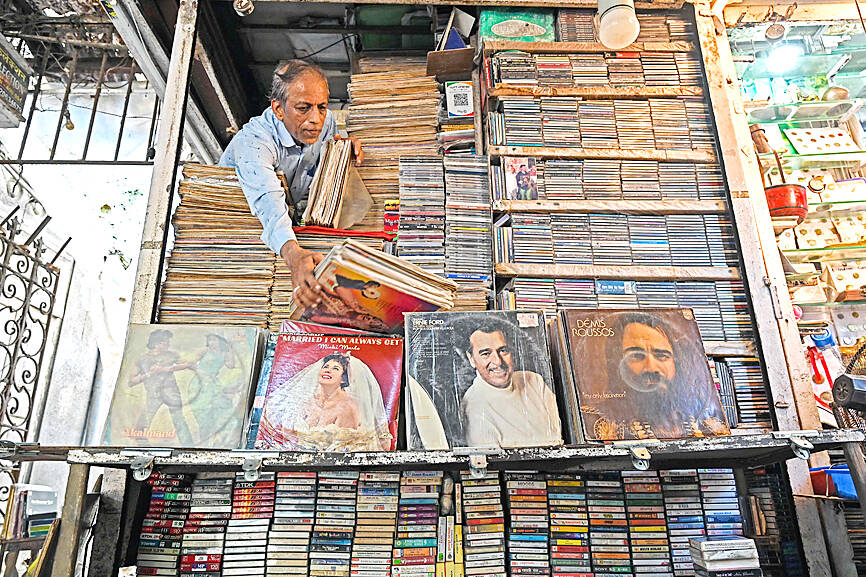Melting plastic pellets into chunky discs then squashed flat, a worker presses records in what claims to be the first vinyl plant to open in India in decades.
Warm music with a nostalgic crackle fills the room — a Bollywood tune from a popular Hindi movie.
“I’m like a kid in a candy shop,” said Saji Pillai, a music publishing veteran in India’s entertainment capital, Mumbai, who began pressing in August.

Photo: AFP
The revival of retro records among Indian music fans mirrors a global trend that has seen vinyl sales explode from the US to the UK and Brazil.
Pillai, 58, said he entered the music industry as “vinyl was just going out.”
He spent the past few years importing records from Europe for his music label clients.

Photo: AFP
He opened his own plant — cutting import taxes and shipping times — to focus on Indian artists and market tastes from Bollywood to indie pop after recording “growing interest.”
Retailers including Walmart have embraced the retro format, and megastars including Taylor Swift, Billie Eilish and Harry Styles have sent pressing plants around the world into overdrive.
In India, the scale of the revival is far smaller — in part due to lower household incomes — but younger fans are joining in the trend.
Although the industry was still “challenging,” the market was “slowly growing,” Pillai said.
Vinyl record systems do not come cheap.
A decent turntable, sound system and 10 records cost 50,000 to 100,000 rupees (US$591.87 to US$1,184), the lower end of which is more than double the average monthly salary.
For those who can afford it, the old system offers a new experience.
“You go to the collection, take it out carefully... You end up paying more attention,” said 26-year-old Sachin Bhatt, a design director who grew up downloading songs.
“You hear new details, you make new mental observations... There is a ritual to it,” he said.
Vinyl records create a “personal, tangible connection to the music we love,” Bhatt added. “I know a lot of young kids who have vinyl, even if they don’t have a player. It’s a way for them to show their love for the music.”
Vinyl is a “completely different” experience than “shoving his AirPods” into his ears and going for a run, said 23-year-old Mihir Shah, who has a collection of about 50 records.
“It makes me feel present,” he said.
Catering to the fans is a group of record stores, complementing the old records on sale in alleyway shops and flea markets.
“There’s been a huge resurgence,” said Jude De Souza, 36, who runs the Mumbai record store The Revolver Club, adding that the growing interest dovetailed with the wider availability of audio gear and records.
Listening sessions organized by the store bring in more than 100 fans.
Despite the growth in popularity, India’s vinyl sales remain a drop in the global ocean. While the world’s most populous country has one of the biggest bases of music listeners, with local songs racking up big views on YouTube and music streaming platforms, its publishing industry is small by global revenue standards.
Music publishing revenues hit about US$100 million in the 2023 fiscal year — far smaller than Western markets — according to accountancy giant EY.
That is partly due to the lower spending power of its fans, coupled with runaway piracy.
At a small roadside store, 62-year-old Abdul Razzak is the bridge between India’s old vinyl culture and newer fans, selling up to 400 secondhand records each month to customers aged 25 to 75.
He sells records for 550 to 2,500 rupees, and believes new vinyl pressed in India would prove popular if it is priced within that bracket.
For Pillai and his small factory, it provides an opportunity.
He could — if demand was there — “easily” triple the factory’s monthly production capacity of more than 30,000.
“Even though people love digital, the touch feel is not there,” Pillai said. “Here there’s ownership, there’s love for it, there’s romance, there’s love, there’s life.”

MONEY GRAB: People were rushing to collect bills scattered on the ground after the plane transporting money crashed, which an official said hindered rescue efforts A cargo plane carrying money on Friday crashed near Bolivia’s capital, damaging about a dozen vehicles on highway, scattering bills on the ground and leaving at least 15 people dead and others injured, an official said. Bolivian Minister of Defense Marcelo Salinas said the Hercules C-130 plane was transporting newly printed Bolivian currency when it “landed and veered off the runway” at an airport in El Alto, a city adjacent to La Paz, before ending up in a nearby field. Firefighters managed to put out the flames that engulfed the aircraft. Fire chief Pavel Tovar said at least 15 people died, but

LIKE FATHER, LIKE DAUGHTER: By showing Ju-ae’s ability to handle a weapon, the photos ‘suggest she is indeed receiving training as a successor,’ an academic said North Korea on Saturday released a rare image of leader Kim Jong-un’s teenage daughter firing a rifle at a shooting range, adding to speculation that she is being groomed as his successor. Kim’s daughter, Ju-ae, has long been seen as the next in line to rule the secretive, nuclear-armed state, and took part in a string of recent high-profile outings, including last week’s military parade marking the closing stages of North Korea’s key party congress. Pyongyang’s official Korean Central News Agency (KCNA) released a photo of Ju-ae shooting a rifle at an outdoor shooting range, peering through a rifle scope

South Korea would soon no longer be one of the few countries where Google Maps does not work properly, after its security-conscious government reversed a two-decade stance to approve the export of high-precision map data to overseas servers. The approval was made “on the condition that strict security requirements are met,” the South Korean Ministry of Land, Infrastructure and Transport said. Those conditions include blurring military and other sensitive security-related facilities, as well as restricting longitude and latitude coordinates for South Korean territory on products such as Google Maps and Google Earth, it said. The decision is expected to hurt Naver and Kakao

India and Canada yesterday reached a string of agreements, including on critical mineral cooperation and a “landmark” uranium supply deal for nuclear power, the countries’ leaders said in New Delhi. The pacts, which also covered technology and promoting the use of renewable energy, were announced after Indian Prime Minister Narendra Modi and Canadian Prime Minister Mark Carney hailed a fresh start in the relationship between their nations. “Our ties have seen a new energy, mutual trust and positivity,” Modi said. Carney’s visit is a key step forward in ties that effectively collapsed in 2023 after Ottawa accused New Delhi